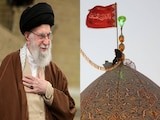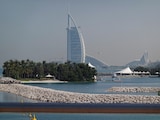Dr Ashok Gadgil, who was honoured with the United States' top award for technology and innovation, has always maintained a focus on the poor and the environment through his many inventions. While probably best known for the Berkeley-Darfur Stove, his contributions span the areas of water purification, efficient lighting and infant care, and have contributed to saving many lives, especially in the developing world.
An Indian-American civil and environmental engineer, Dr Gadgil was conferred the National Medal for Technology and Innovation by US President Joe Biden at the White House while fellow Indian-American Dr Subra Suresh was awarded the National Medal of Science. "Their accomplishments advance American leadership in science, technology, and innovation, and their work inspired the next generation of American minds," the White House said in a statement.
In an exclusive interview with NDTV on Wednesday, Dr Gadgil spoke about his various inventions and also indicated that he is far from ready to rest on his laurels and is now focusing on preventing heat deaths in the developing world.
Light-Bulb Moment
One of the challenges faced by the developing world was getting people to adopt energy-efficient lights and solutions seemed to be lacking, until Dr Gadgil had a light-bulb moment.
"For a long time, it was possible to save billions of dollars, both for the consumers and for the electric-supply utility in the developing countries because the consumers were too poor to buy efficient electric lighting and they were receiving - most of them, 80% of them, depending on the poverty of the country - what we in the US call lifeline rates or subsidised electricity prices," the innovator said.
"Subsidised electricity was not worth saving with full-priced efficient devices and that hurt everybody because more electricity was used, which means fewer homes were electrified. And the utility kept on losing money on the subsidy," he added.
The solution Dr Gadgil came up with was to have the utilities participate in the market and subsidise electric efficient lighting devices rather than subsidising electricity. "And nobody had thought of that," he asserted.
Mumbai To Darfur
The Berkeley-Darfur stove is a low-cost natural convection stove, which is very efficient and ensured that women in western Sudan's Darfur saved over $1,500 (approximately Rs 1.25 lakh) a year.
And how much did the stove cost? "It cost $20 (Rs 1,660 approx) fully assembled and transported from Mumbai to Africa. We had to improve the combustion efficiency of the wood and we had to improve the heat-transfer efficiency of the fire into the pot. And both of these together is what allowed much less fuel use. The key was to make sure that it worked with their pots, their fuel, their cooking methods and still was inexpensive and easy to assemble," said Dr Gadgil.
The stoves were made in Mumbai and shipped to Africa and assembled by Darfur refugees' own labour and they were paid for the assembly.
UV Water Disinfection
One of Dr Gadgil's inventions that saved lives was a low-cost UV-filtration-based water disinfection system. The scientist said the focus was on disinfecting drinking water at a price local people could afford.
"The big innovation was to look for something that will disinfect the water really, really, cheaply, but will also have no moving parts, will have nothing to foul, will be easy to maintain in the field in the developing world, in the rural context," the scientist said.
"What I came up with was a way to disinfect with Ultraviolet-C light, which actually destroys the DNA of the pathogen, but keep the light away from the water without having to use glass leaves, by suspending it in the air, so there is only an air gap between the lamp and the water," he said.
Dr Gadgil added that making selling this water profitable ensured that people made some money and saved lives in the process.
Removing Arsenic With Electricity
Another key innovation was the low-cost technology to remove arsenic from drinking water which was invented specifically keeping India and Bangladesh in mind.
"The technology is based on releasing a kind of iron rust into the water with a small amount of electric current... and that dissolved rust captures arsenic and settles out, leaving the water safe to drink. We have two plants licensed by the university operating in India now, in West Bengal and Uttar Pradesh," the scientist said.
Expanding the scope of his work, Dr Gadgil also contributed to a $100 plant-based non-electric infant warmer to avoid infant deaths from hypothermia.
"About 1 million infants die in the first days of their birth from hypothermia. The places where they die do not have reliable electricity. The infant warmer has reduced all-cause deaths of neo-natals by a factor of three for a large trial in Rwanda public hospitals. That's a very dramatic impact."
Tinker, Tailor?
Asked about what he does in his free time and if he is hands-on and a tinkerer, Dr Gadgil replied in the affirmative and said working with his hands gives him concrete ideas on what could be built.
Dr Gadgil said he is now thinking about how to avoid a large number of heat deaths "which are coming to the developing world faster than anybody is ready for".
"And the heat deaths are coming because of climate change effects and we are going to exceed survival temperatures around the world in the developing world because we are in the hot part of the world and people aren't ready for it," Dr Gadgil emphasised.















